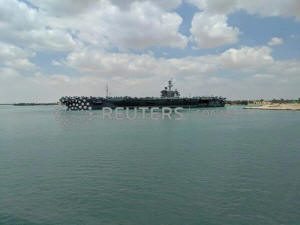|
Exclusive: U.S. commander says he could
send carrier into Strait of Hormuz despite Iran tensions
 Send a link to a friend
Send a link to a friend
 [May 10, 2019]
By Phil Stewart [May 10, 2019]
By Phil Stewart
WASHINGTON (Reuters) - The commander overseeing
U.S. naval forces in the Middle East told Reuters on Thursday that
American intelligence showing a threat from Iran will not prevent him
from sending an aircraft carrier through the vital Strait of Hormuz, if
needed.
Vice Admiral Jim Malloy, commander of the U.S. Navy's Bahrain-based
Fifth Fleet, did not say whether he would send the USS Abraham Lincoln
carrier strike group into the strategic waterway off Iran, through which
passes a fifth of oil consumed globally.
The group, whose deployment to the Middle East was fast-tracked by
President Donald Trump's administration as a warning to Iran, transited
through the Suez Canal into the Red Sea on Thursday and was now under
Malloy's command.
"If I need to bring it inside the strait, I will do so," Malloy said in
an interview by phone. "I'm not restricted in any way, I'm not
challenged in any way, to operate her anywhere in the Middle East."

Iran has dismissed the U.S. contention of a threat as "fake
intelligence." Tensions have risen between Tehran and Washington since
the Trump administration withdrew a year ago from a 2015 international
nuclear deal with Iran and began ratcheting up sanctions to throttle the
Islamic Republic's economy.
The Pentagon said it expedited the Lincoln's deployment and sent bombers
to the Middle East after U.S. intelligence signaled possible
preparations by Tehran to stage attacks against U.S. forces or
interests. Malloy said the intelligence was linked "with actual activity
that we observed."
"And that was certainly enough for me ... to say that we saw this as a
threat," he said.
U.S. officials, speaking on condition of anonymity, say one of the
pieces of intelligence indicated Iran had moved missiles on boats. One
of the officials said the particular missile observed was perhaps
capable of launching from a small ship.
The officials also noted growing concerns about the threat from
Iran-backed Shi'ite militia in Iraq, which have long avoided any
confrontation with U.S. troops under the shared goal of defeating
Islamic State, a Sunni militant organization.
Malloy, whose naval forces would support efforts to defend U.S. troops
throughout the region, did not enter into details on the U.S.
intelligence. But he confirmed that some of the U.S. concerns centered
on Iranian missiles.
"It might be a new fielding of technology by Iran," Malloy said, adding
the weaponry "falls under the category of destabilizing and offensive in
nature."
[to top of second column]
|

U.S. aircraft carrier the USS Abraham Lincoln is pictured while it
travels through the Suez Canal in Egypt May 9, 2019 in this picture
obtained from social media. Bud Kinsey/via REUTERS

'NOT IN A WAR-PLAN FOOTING'
The nuclear deal between Iran and six world powers required Tehran
to curb its uranium enrichment capacity to head off any pathway to
developing a nuclear bomb, in return for the removal of most
international sanctions. Iran has always said it pursued a nuclear
program for peaceful purposes only.
In the past month, the U.S. designated Iran's Revolutionary Guard (IRGC)
as a terrorist organization and increased sanctions pressure, with
an explicit goal of slashing Iran's oil exports to zero.
Beyond the deployment of the Lincoln, the United States also
dispatched B-52 bombers to the Middle East in response and is also
weighing the redeployment of Patriot missiles after pulling several
out of the region last year, officials said.
Some of Trump's critics fear the White House is intentionally
provoking Iran. Although the military sought the deployments, the
announcement itself came in a statement from White House national
security adviser John Bolton - a hawk on Iran policy.
Senator Tim Kaine, a Democrat, said he worried "that the Trump
administration is leading us toward an unnecessary war."
Malloy, in his first interview since the IRGC designation, confirmed
that U.S. forces were operating at a heightened state of readiness.
Still, Malloy stressed that the U.S. military was not seeking or
preparing for war with Iran.
"I am not in a war-plan footing and have not been tasked to do so,"
Malloy said. "However we are absolutely ready to respond to any
aggression against the United States, partners in the region, or our
interests."

Trump also reaffirmed that message on Thursday, saying he did not
want conflict.
"We have one of the most powerful ships in the world that is loaded
up and we don't want to do anything," Trump told reporters.
(Reporting by Phil Stewart; additional reporting by Idrees Ali;
Editing by Mary Milliken and Grant McCool)
[© 2019 Thomson Reuters. All rights
reserved.]
Copyright 2019 Reuters. All rights reserved. This material may not be published,
broadcast, rewritten or redistributed.
Thompson Reuters is solely responsible for this content. |